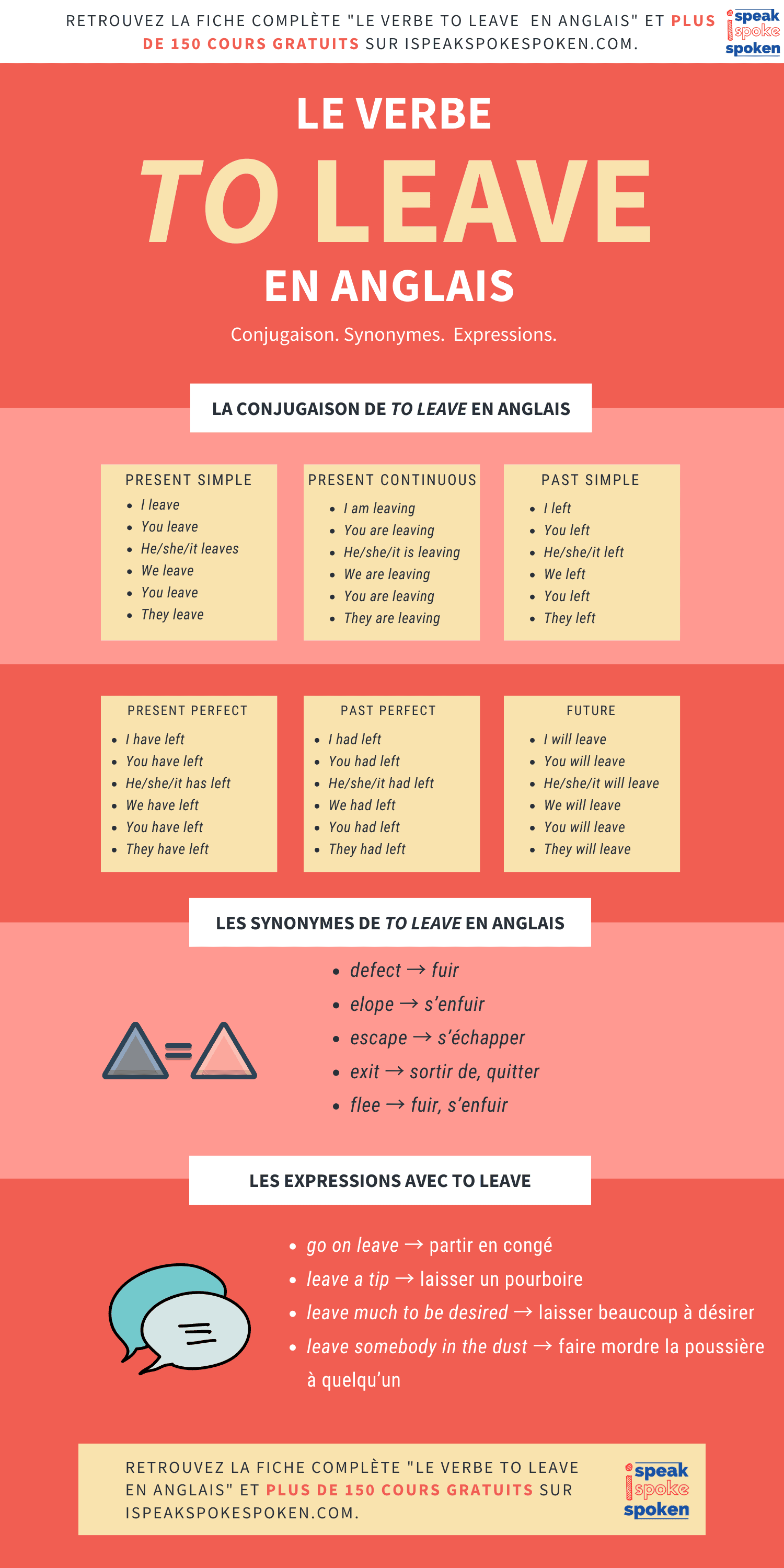Modes, temps, définition, synonymes, expressions, et même un phrasal verb : ne perdez rien de la conjugaison de leave en anglais !
Tableaux de conjugaison de leave en anglais
Conjugaison du verbe leave à l’indicatif
Le verbe leave au present simple
- I leave
- You leave
- He/she/it leaves
- We leave
- You leave
- They leave
Le verbe leave au present continuous
- I am leaving
- You are leaving
- He/she/it is leaving
- We are leaving
- You are leaving
- They are leaving
Le verbe leave past simple
- I left
- You left
- He/she/it left
- We left
- You left
- They left
Le verbe leave au past continuous
- I was leaving
- You were leaving
- He/she/it was leaving
- We were leaving
- You were leaving
- They were leaving
Le verbe leave au present perfect
- I have left
- You have left
- He/she/it has left
- We have left
- You have left
- They have left
Le verbe leave au present perfect continuous
- I have been leaving
- You have been leaving
- He/she/it has been leaving
- We have been leaving
- You have been leaving
- They have been leaving
Le verbe leave au past perfect
- I had left
- You had left
- He/she/it had left
- We had left
- You had left
- They had left
Le verbe leave au past perfect continuous
- I had been leaving
- You had been leaving
- He/she/it had been leaving
- We had been leaving
- You had been leaving
- They had been leaving
Le verbe leave au future
- I will leave
- You will leave
- He/she/it will leave
- We will leave
- You will leave
- They will leave
Le verbe leave au future continuous
- I will be leaving
- You will be leaving
- He/she/it will be leaving
- We will be leaving
- You will be leaving
- They will be leaving
Le verbe leave au future perfect
- I will have left
- You will have left
- He/she/it will have left
- We will have left
- You will have left
- They will have left
Le verbe leave au future perfect continuous
- I will have been leaving
- You will have been leaving
- He/she/it will have been leaving
- We will have been leaving
- You will have been leaving
- They will have been leaving
Conjugaison du verbe leave au conditionnel
Le verbe leave au conditional present
- I would leave
- You would leave
- He/she/it would leave
- We would leave
- You would leave
- They would leave
Le verbe leave au conditional present continuous
- I would be leaving
- You would be leaving
- He/she/it would be leaving
- We would be leaving
- You would be leaving
- They would be leaving
Le verbe leave au conditional perfect
- I would have left
- You would have left
- He/she/it would have left
- We would have left
- You would have left
- They would have left
Le verbe leave au conditional perfect continuous
- I would have been leaving
- You would have been leaving
- He/she/it would have been leaving
- We would have been leaving
- You would have been leaving
- They would have been leaving
Les autres formes
L’infinitif de leave
- to leave
Participe présent de leave
- leaving
Participe passé de leave
- left
L’impératif de leave
- leave
- let’s leave
Définition de leave en anglais
Que veut dire le verbe leave en anglais ?
Le Cambridge Dictionary donne plusieurs définitions du verbe leave.
Penchons-nous sur les principales :
1. To go away from someone or something, for a short time or permanently
They’ll be leaving on Monday.
→ Ils partiront lundi.
2. To not take something or someone with you when you go, either intentionally or by accident
I’d like to leave her a message.
→ J’aimerais lui laisser un message.
3. If something leaves something else, a part or effect of it stays after it has gone or been used
Peter’s car left skid marks on the road.
→ La voiture de Peter a laissé des traces de dérapage sur la route.
4. If you leave something in a particular condition, you do not touch it, move it, or act to change it in any way, so that it stays in the same condition
Leave the door open.
→ Laisse la porte ouverte.
5. If you leave something or someone doing something, he, she, or it is still doing it when you go away
I left my computer running all night.
→ J’ai laissé l’ordinateur allumé toute la nuit.
6. To not eat or use all of something
There was no food left when I returned.
→ Il n’y avait plus rien à manger quand je suis rentré.
7. To stop doing something, or to leave a place because you have finished an activity
We usually leave work at 5.
→ Nous finissons habituellement le travail à 17 heures.
8. To end a relationship with a husband, wife, or partner and stop living with them
He left his girlfriend when she was pregnant.
→ Il a quitté sa petite amie quand elle était enceinte.
9. If you leave (doing) something, you wait before you do it
Let’s leave this for now.
→ Mettons cela de côté pour le moment.
10. To leave a wife, husband, or other close family member is to die while these family members are still alive
My husband died at 42 and left me with two kids.
→ Mon mari est mort à 42 ans et m’a laissée avec deux enfants.
11. If you leave something that you own to someone, you say they should receive it when you die
When he died, he left all his money to a local charity.
→ À sa mort, il a laissé tout son argent à une association caritative locale.
12. To allow someone to make a choice or decision about something, or to make someone responsible for something
How can you leave that decision to him?
→ Comment peux-tu lui laisser prendre cette décision ?
Pour accéder à l’intégralité de la page du Cambridge Dictionary, cliquez ici !
Les phrasal verbs avec leave en anglais
Rappel : les phrasal verbs (ou “verbes à particule”) sont des verbes qui, lorsqu’ils sont suivis d’un autre mot (la particule), voient leur sens initial complété ou modifié.
Voici les principaux phrasal verbs formés sur le verbe leave :
- leave off → arrêter de (familier)
- leave somebody out → exclure, mettre à l’écart quelqu’un
- leave something out → oublier, omettre
- leave something with somebody → laisser, confier quelque chose à quelqu’un
- leave something/somebody behind → oublier, laisser (omettre d’apporter)
Les synonymes de leave en anglais
En fonction du contexte, vous pouvez remplacer le verbe to leave par l’un des verbes suivants :
- abscond → s’enfuir, s’échapper, s’éclipser
- bequeath → léguer
- decamp → décamper (familier)
- defect → fuir
- desert → déserter
- disappear → disparaître
- elope → s’enfuir
- escape → s’échapper
- exit → sortir de, quitter
- flee → fuir, s’enfuir
- forsake → abandonner, délaisser
- go → partir
- quit → quitter (un programme)/démissionner
- relinquish → quitter, abandonner
- resign → démissionner
- sally → sortir
- vacate → quitter (un lieu ou un poste)
- vamoose → filer, se tirer (familier)
- vanish → disparaitre, se volatiliser
Expressions avec leave en anglais
- go on leave → partir en congé
- leave a lasting impression → faire forte impression/marquer les esprits
- leave a sour taste → laisser un goût amer/rester en travers de la gorge
- leave a tip → laisser un pourboire
- leave much to be desired → laisser beaucoup à désirer
- leave no stone unturned → chercher partout, remuer ciel et terre
- leave somebody alone → laisser tranquille
- leave somebody hanging → laisser dans le flou/dans l’expectative
- leave somebody high and dry → laisser en plan, planter quelqu’un (familier)
- leave somebody holding the bag → faire payer les pots cassés/faire porter le chapeau àquelqu’un
- leave somebody in the dust → faire mordre la poussière à quelqu’un
- leave somebody out in the cold → exclure, mettre à l’écart
- leave the nest → quitter le nid (partir du domicile parental)
- maternity leave (nom) → congé maternité
- take French leave → filer à l’anglaise
À l’instar de to learn, to hang, to drive, to buy et to sleep, to leave est un verbe irrégulier. Il faut donc faire particulièrement attention au prétérit et au participe passé.


